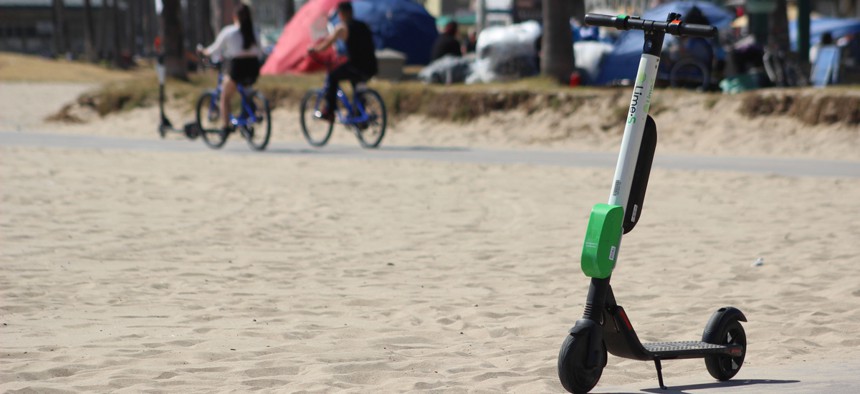Los Angeles Inks New Data-Sharing Agreement With Scooter and Bikeshare Companies

A Lime e-scooter along Venice Beach in Los Angeles. Shutterstock
“This is the way we must work together to meet the challenges of tomorrow,” said Seleta Reynolds, the LADOT’s general manager.
LOS ANGELES — The introduction of shared bicycles and e-scooters in U.S. cities hasn’t necessarily been defined by proactive relationships between local governments and the companies that operate the last-mile mobility alternatives. When dockless bicycles and scooters suddenly appear on public rights of way, city halls, responding to public complaints, have moved quickly to either ban them, scramble to write new rules or launch pilot programs to figure out next steps to accommodate them long term.
On Friday during a breakfast event at the National League of Cities annual City Summit, two shared bicycle and scooter companies, Lime and Spin, announced a new data-sharing agreement with the Los Angeles Department of Transportation that flips that script a bit.
“This is the way we must work together to meet the challenges of tomorrow,” said Seleta Reynolds, the LADOT’s general manager.
According to Friday’s announcement, the Mobility Data Specification is “a data standard and set of vocabulary to help cities enforce, evaluate, and manage mobility providers who operate in the public right of way.” While the data-standardization framework currently involves existing shared modes of transportation like dockless scooters and bikes, it’s designed to also accommodate autonomous cars, drones and “whatever else the future may hold.”
Reynolds discussed that when vendors want to meet with the LADOT, they’re often approaching her department with a “fully formed product” that doesn’t necessarily meet the city’s specific needs. But with the way the data agreement was structured, Reynolds said that “we are at the table with an equal footing” with the companies.
“We are thrilled with the notion of sharing data,” said Andrew Savage, a vice president at Lime. “This conversation is extremely exciting.”
The companies and LADOT will use a shared-mobility platform from San Francisco-based Remix to manage the data that’s shared through the agreement. “Remix was the very first company to the starting line,” Reynolds said.
Other cities are in the pipeline, according to the Remix, which currently works with more than 300 cities on three continents to help officials and planners make better informed decisions in how to manage their public rights of way.
For transportation agencies, data is just as important as concrete and when you’re responsible for streets and public rights of way like Reynolds is, “you need facts, you need information and you need to make decisions very quickly,” she said.
For shared scooters and bicycles, the agreement with LADOT will include data that provides insights on things like user demand and trip patterns that will, in turn, help city governments improve their infrastructure and manage public rights of way under their jurisdiction.
“Movement data is critical to understanding the impact of new mobility options on city infrastructure, such as transit and streets,” said Remix cofounder Tiffany Chu. “It provides insights into the equitable distribution of new modes amongst all communities, how they complement existing public transportation, and how cities can reach their goals to lower emissions by shifting away from single-occupancy vehicles, among other things.”
Michael Grass is Executive Editor of Government Executive’s Route Fifty and is based in Seattle.
NEXT STORY: Las Vegas’ Smart City Approach Is More Than Just Dazzle






